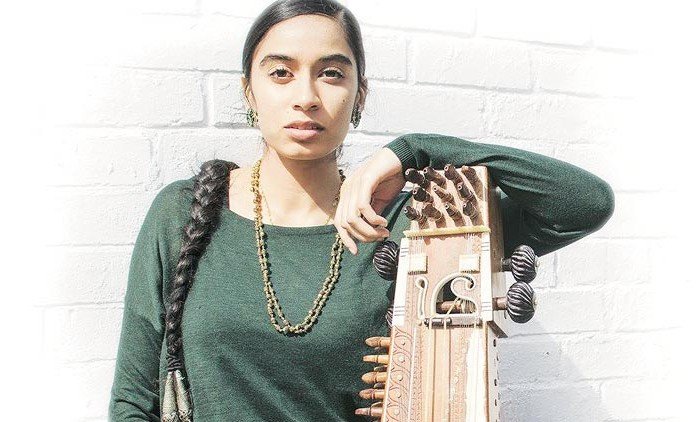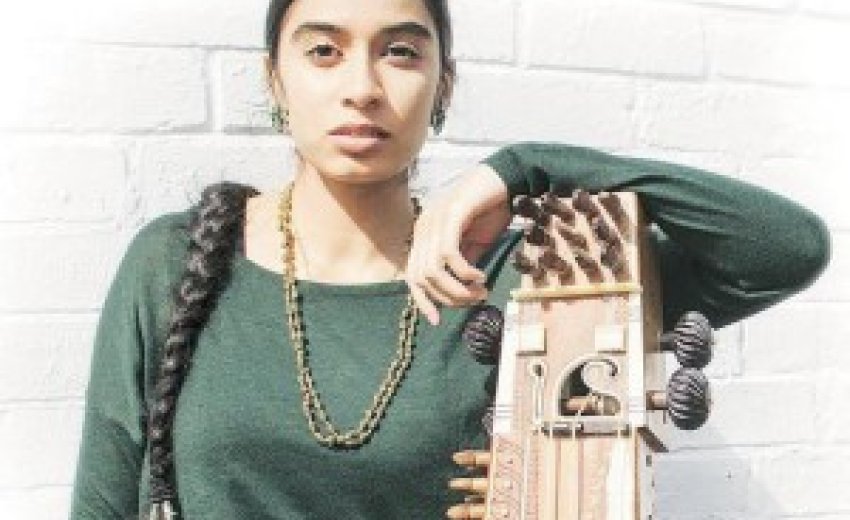Amrit Kaur Lohia, a London-based musician who merges Punjabi folk with jazz and soul, is on her first tour of India.
 |
| Amrit Kaur Lohia finds the dolorous notes of the sarangi a perfect complement to her singing
|
Aaj aakhan Warish Shah no, ki tu kabra vichon bol…
Ikk royi si dhi Punjab di, Tu likh likh maarey wain,
Ajj lakhaan dhiyan rondiyan, Tenu Waris Shah nuu kain
(Today, I call Waris Shah, Speak from inside your grave…
Once, one daughter of Punjab cried; you hit out by writing a wailing saga;
Today, a million daughters cry to you, Waris Shah)
Feb 10, 2016: When 24-year-old Amrit Kaur Lohia sang this Amrita Pritam poem at the SOAS University of London auditorium in her shrill-yet-powerful voice, with her head covered and a sarangi in tow, she prised open the pain of Partition and prickled the hearts of those present. Lohia, through Amrita Pritam’s poetry, was asking Waris Shah, the famous sufi saint to intervene in the violence, against women. “This piece always brings up such memories of the Partition. It makes people rethink about their roots and encourages them to think beyond borders. The stories are from many years ago, but the poem remains universal,” says Lohia, who had no idea that author and founder-director of Jaipur Literature Festival, Namita Gokhale, was in the audience.
Moved by the performance, Gokhale invited Lohia for a performance at the Jaipur Literature Festival that concluded last month. Now, Lohia is touring the country with the song and many others from her arsenal of Indian classical and folk merged with jazz and soul. This is the first such musical trip to India for Lohia, a student of history at SOAS.
Raised in Edmonton in a Sikh family, she grew up singing shabads and kirtan in gurudwaras after school and playing Britney Spears and Christina Augilera tapes. A reticent girl, she was “extremely loud” when she sang. “I think it was a way of expression for me as, otherwise, I wasn’t much of a talker,” says Lohia, who could never identify with the sound of a harmonium, despite it being an integral element in kirtan. She soon discovered dilruba and sarangi at a neighbouring gurudwara and identified with the dolorous tone of the latter. “There was something about this instrument. I wanted to get to know it better,” says Lohia, who has been learning the sarangi from Surjit Singh Aulakh, a senior disciple of maestro Pt Ram Narayan.
Waris Shah, however, was her own discovery during the preparation of a play based on Manto’s Toba Tek Singh at SOAS. “Before I began studying history I didn’t have much idea of what the Partition was. My dad had mentioned it in the context of how my great-grandfather lost all his property because of that. It’s been a gradual discovery. It’s taken me a while to figure it out,” says Lohia, who includes elements of jazz and soul along with Punjabi folk and Indian classical.
“I never saw boundaries between the genres. What struck me about Ella James and Aretha Franklin was that I could hear them crying through the singing. I felt classical was more about technicality,” says Lohia. The former resonated with her more and are a massive influence in the way she sings, in the way she approaches composition. “Since Punjabi folk was always there, I didn’t even realise how organic it became,” says Lohia.
